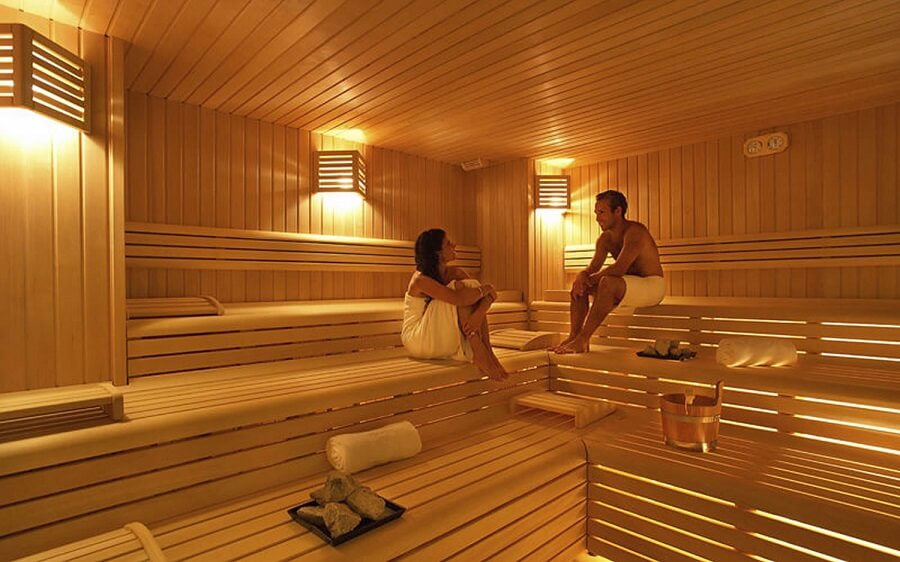Going to the sauna is a method that most people usually consider. The reason: is the idea that going to the sauna after training is good for improving skin health, reducing stress, and muscle recovery times.
While its results should not be exaggerated, research claims that going to the sauna is suitable for relieving anxiety and enhancing muscle recovery processes.
Going to the sauna after training with high-performance athletes was positive. Studies have shown benefits such as a significant improvement in nutritional fluids to muscle tissue and decreased blood cortisol levels. (1,2,6)
To say yes or no to the sauna and determine the real benefits and contraindications in this article, we tour the scientific evidence to date.
What is the sauna, and how does it work?
The sauna is a steam bath in a delimited area at high temperatures. The word sauna can be used in both feminine and masculine; depending on the relative humidity inside the enclosure, it can be humid or dry.
The best-known types of saunas are Finnish; these are simple structures made of wood with rock systems that are electrically heated. The water is drained to keep the environment dry, and the maximum temperature is 90 degrees.
Other types of saunas, such as Turkish and Finnish, reach lower temperatures (55 ° C) but with a humidity of up to 100%. They are usually airtight rooms where these conditions are maintained.
The benefits are very similar to those of the Finnish sauna, although with fewer production requirements. It is essential to know that the ventilation system must change the air about three times every 8 hours in a good sauna. (6)
Sauna benefits
The benefits of the sauna are several. They improve muscle recovery times and improve the levels of hormones related to stress. Here are seven gifts of the sauna:
- Reduce the stress hormone cortisol
One of the benefits of the sauna is to improve the levels of hormones related to well-being. Its regular use is associated with better serotonin levels. As well as a decrease in the stress hormone cortisol (1).
- Improve your mood
Intense exposure to heat in a short period activates a particular area of the brain: the hypothalamus. (6) The benefit: improved mood. Going to the sauna can be used as a treatment to reduce symptoms of mild anxiety and depression.
- Improve blood circulation
While during the sauna, the diameter of the blood vessels increases, and the pressure can drop. Frequent changes in body temperature provoke a positive reaction in the blood circulation. In the long term, it can improve the circulatory system. (6)
- Reduce skin blemishes
Sweating, dilation, and subsequent compression of the pores after the temperature contrast with a cold shower effectively reduce oily skin and skin imperfections. This is perhaps one of the best-known sauna benefits. In addition, the same effect applies to the hair, so another of the benefits of the sauna is the improvement of the health of the hair.
- Reduce muscle recovery times
One of the most controversial sauna benefits is the improvement in muscle fiber repair times. Although the articles published are controversial, most have confirmed positive effects on high-performance athletes. (1,2,6)
- Increase oxygen transport to hair follicles
After training, going to the sauna can increase cellular oxygen transport to the hair tissues. Research showed significant oxygenation improvements after sauna sessions of about 15 minutes. (6) So, it is a promising method to prevent hair loss.
Sauna contraindications
While the sauna is considered relatively safe, one tends to think it has no contraindications. It is essential to take certain precautions.
Going to the sauna can cause severe problems in people with a deteriorated cardiovascular system, just as it is essential not to have skin infections. Mild yeast infections are common in those who go to the sauna regularly.
In addition, it is not advisable to go to the sauna after swimming since the pressure is usually low. This can lead to more significant side effects, and one of its contraindications is that it can cause dizziness and even fainting.
Going to the sauna after using recreational drugs can be fatal. And although it may seem strange, it is a relatively common fact. Six thousand one hundred seventy-five cases of sudden deaths have been registered due to the combined use of the sauna with alcohol. (3)
If you want to get the benefits of the sauna without finishing in a hospital, forget about alcohol and other drugs. The contraindications of the sauna are:
- People with heart disorders
- Take blood pressure medicine
- Pregnant women (first three months of gestation)
- Have varicose veins
- Tumors or people undergoing cancer treatments
- Hepatitis or inflammatory diseases
- To have a fever
- Fungus or skin infections
- Drink alcohol
- People with uncontrolled diabetes
- After sports that lower blood pressure (swimming, HIIT, CrossFit)
What should I do before going to the sauna? – Advice
Before going to the sauna, the ideal is to have a series of precautions. Not only to increase its benefits but to reduce possible side effects and contraindications. Here are five tips to keep in mind before going to the sauna:
- Drink 2 or 3 glasses of water
Staying hydrated is essential before being exposed to high temperatures. Isotonic or electrolyte drinks are a good idea before going to the sauna. The possible side effects of dehydration can be counteracted with drinking water or hydrating drinks.
- Avoid alcohol
Alcohol increases dehydration. Before going to the sauna, forget about drinking alcohol; even a couple of drinks can cause dizziness and fainting. Drinking alcohol is one of the central sauna contraindications.
- Don’t overeat
Going to the sauna after eating large amounts of food is not recommended. The body will be trying to process the food and, at the same time dealing with the temperature shock—the result: digestion problems and severe dizziness.
- Please don’t overdo it over time.
15 or 20 minutes of sauna is enough. A more extended amount of time will not bring more significant health benefits. The benefits of the sauna in muscle recovery have been proven only after short time sessions. (2)
- Don’t go with colds or minor infections
Being sick, the defenses are down. However, one of the benefits of the sauna is to stimulate the blood supply to the different parts of the body. Intense temperature changes will only complicate your immune system.
Can going sauna eliminate toxins?
This is one of the benefits of the sauna that has generated the most controversy in the scientific community. The elimination of toxins by sweating is a statement that has existed for millennia.
According to research (2), heavy sweating causes dehydration, but it is not always connected with eliminating toxins. The reason: toxins that are not soluble in water will not leave the body.
Therefore, it cannot be generalized that this is one of the benefits of the sauna in all cases. Eliminate toxins by going to the sauna depends on the type of toxins.
Differences with the contrast shower
The contrast shower is a method that consists of alternating the temperature of the water between hot and cold. Studies suggest that a 6-minute contrast shower can shorten muscle repair times in high-performance athletes.
As well as some investigations (7) affirm that taking cold showers can be beneficial for strengthening the immune system and reducing the incidence of SARS.
The benefits of taking a contrast shower are similar to those of the sauna: stimulation of hair follicles (hair grows better and falls less), cleansing of the skin, and mental and muscular relaxation. (7.8)
The procedure should be done at least 3-4 times a week, if possible after a training session, to reap the benefits of a contrast shower.
ABSTRACT
After training, I go to the sauna to improve muscle recovery processes and clean impurities from the skin.
The benefits of the sauna have been proven after sessions of about 15-20 minutes. Exaggerating over time can lead to pressure drops, even fainting.
Another benefit of the sauna is that it contributes to a better feeling of general well-being and reduces the levels of the stress hormone cortisol.
The contraindications of the sauna are the use of alcohol, recreational drugs, heart disorders, varicose veins, skin infections, and colds, among others.
If you decide to go after training, drink 2 or 3 glasses of water and not overeat.







